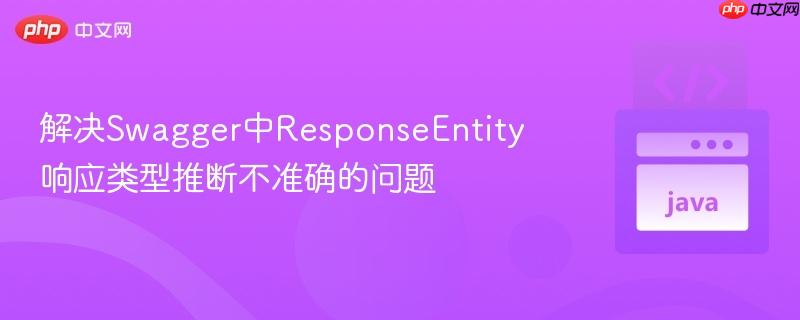
本文旨在解决在使用Spring Boot和Swagger时,`ResponseEntity`返回类型未正确显示其包含数据模型的问题。核心在于通过为`ResponseEntity`明确指定泛型类型,使Swagger能够准确推断并展示API的实际响应数据结构,从而提升API文档的准确性和可读性。
在使用Spring Boot构建RESTful API并结合Swagger进行API文档生成时,我们常常利用ResponseEntity来灵活控制HTTP响应的状态码、头部信息以及响应体。然而,一个常见的问题是,当ResponseEntity没有明确指定泛型类型时,Swagger可能无法正确地推断出其响应体的具体数据模型,导致在API文档中显示为通用的、不包含实际业务数据的结构,例如{ "body": {}, "statusCode": "ACCEPTED", "statusCodeValue": 0 }。这严重影响了API文档的实用性和可读性。
考虑以下示例代码,其中showActivationCode方法返回一个未指定泛型类型的ResponseEntity:
@ApiOperation(value = "显示激活码")
@GetMapping("/showActivationCode")
@ApiResponses({
@ApiResponse(code = 200, message = "OK"),
@ApiResponse(code = 403, message = "未登录")
})
public ResponseEntity showActivationCode(HttpSession session) {
if ("1".equals(session.getAttribute("isAdmin"))) {
// 返回 List<ActiveCode>
return ResponseEntity.status(200).body(userService.getActiveCode());
} else {
// 返回错误信息字符串
return ResponseEntity.status(403).body("未登录");
}
}在这种情况下,userService.getActiveCode()方法返回List
如果我们将返回类型直接改为List
@ApiOperation(value = "显示激活码")
@GetMapping("/showActivationCode")
@ApiResponses({
@ApiResponse(code = 200, message = "OK"),
@ApiResponse(code = 403, message = "未登录")
})
public List<ActiveCode> showActivationCode(HttpSession session) {
if ("1".equals(session.getAttribute("isAdmin"))) {
return userService.getActiveCode();
} else {
// 此时无法自定义HTTP状态码,只能返回null或空列表
return null;
}
}然而,这种做法的缺点是无法灵活控制HTTP状态码(例如,无法返回403)。因此,ResponseEntity仍然是首选的返回类型。
解决此问题的关键在于,为ResponseEntity明确指定其响应体body的泛型类型。这为Swagger提供了必要的类型提示,使其能够生成准确的API文档模型。
核心思路:
将方法的返回类型从ResponseEntity修改为ResponseEntity
示例代码:
假设我们的成功响应体是List>。
import org.springframework.http.ResponseEntity;
import org.springframework.web.bind.annotation.GetMapping;
import org.springframework.web.bind.annotation.RestController;
import io.swagger.annotations.ApiOperation;
import io.swagger.annotations.ApiResponse;
import io.swagger.annotations.ApiResponses;
import javax.servlet.http.HttpSession;
import java.util.Collections;
import java.util.List;
// 假设 ActiveCode 和 UserService 已经定义
// class ActiveCode { String code; String isAdmin; String name; }
// class UserService { public List<ActiveCode> getActiveCode() { /* ... */ } }
@RestController
public class ActivationCodeController {
private final UserService userService; // 注入 UserService
private final HttpSession session; // 注入 HttpSession
public ActivationCodeController(UserService userService, HttpSession session) {
this.userService = userService;
this.session = session;
}
@ApiOperation(value = "显示激活码")
@GetMapping("/showActivationCode")
@ApiResponses({
@ApiResponse(code = 200, message = "成功获取激活码", response = ActiveCode.class, responseContainer = "List"),
@ApiResponse(code = 403, message = "未登录或无权限")
})
public ResponseEntity<List<ActiveCode>> showActivationCode() {
if ("1".equals(session.getAttribute("isAdmin"))) {
// 成功时返回状态码200和激活码列表
return ResponseEntity.status(200).body(userService.getActiveCode());
} else {
// 未登录或无权限时返回状态码403,响应体为空列表或null
// 保持泛型类型一致性,避免Swagger解析错误
return ResponseEntity.status(403).body(Collections.emptyList());
// 或者:return ResponseEntity.status(403).body(null);
}
}
}关键改进点:
经过上述修改后,Swagger UI将能够正确地解析API的响应模型。虽然响应仍然会包含statusCode和statusCodeValue等ResponseEntity的元数据,但body字段将准确地显示List
{
"body": [
{
"code": "string",
"isAdmin": "string",
"name": "string"
}
],
"statusCode": "OK",
"statusCodeValue": 200
}这与用户最初期望的包含实际数据模型的效果一致,极大地提升了API文档的准确性和可用性。
在使用Spring Boot和Swagger生成API文档时,为了确保ResponseEntity能够正确地显示其包含的业务数据模型,核心在于为ResponseEntity明确指定泛型类型。通过这种方式,我们不仅能够灵活控制HTTP响应的各个方面,还能为API文档工具提供准确的类型信息,从而生成高质量、易于理解的API文档。遵循这些最佳实践,将显著提升API的开发效率和团队协作体验。
以上就是解决Swagger中ResponseEntity响应类型推断不准确的问题的详细内容,更多请关注php中文网其它相关文章!

每个人都需要一台速度更快、更稳定的 PC。随着时间的推移,垃圾文件、旧注册表数据和不必要的后台进程会占用资源并降低性能。幸运的是,许多工具可以让 Windows 保持平稳运行。

Copyright 2014-2025 https://www.php.cn/ All Rights Reserved | php.cn | 湘ICP备2023035733号